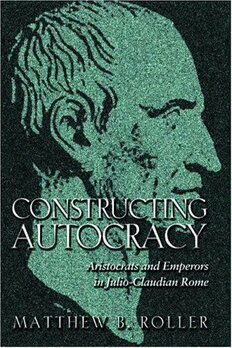Download Constructing Autocracy: Aristocrats and Emperors in Julio-Claudian Rome PDF Free - Full Version
Download Constructing Autocracy: Aristocrats and Emperors in Julio-Claudian Rome by Matthew B. Roller in PDF format completely FREE. No registration required, no payment needed. Get instant access to this valuable resource on PDFdrive.to!
About Constructing Autocracy: Aristocrats and Emperors in Julio-Claudian Rome
Rome's transition from a republican system of government to an imperial regime comprised more than a century of civil upheaval and rapid institutional change. Yet the establishment of a ruling dynasty, centered around a single leader, came as a cultural and political shock to Rome's aristocracy, who had shared power in the previous political order. How did the imperial regime manage to establish itself and how did the Roman elites from the time of Julius Caesar to Nero make sense of it? In this compelling book, Matthew Roller reveals a "dialogical" process at work, in which writers and philosophers vigorously negotiated and contested the nature and scope of the emperor's authority, despite the consensus that he was the ultimate authority figure in Roman society. Roller seeks evidence for this "thinking out" of the new order in a wide range of republican and imperial authors, with an emphasis on Lucan and Seneca the Younger. He shows how elites assessed the impact of the imperial system on traditional aristocratic ethics and examines how several longstanding authority relationships in Roman society--those of master to slave, father to son, and gift-creditor to gift-debtor--became competing models for how the emperor did or should relate to his aristocratic subjects. By revealing this ideological activity to be not merely reactive but also constitutive of the new order, Roller contributes to ongoing debates about the character of the Roman imperial system and about the "politics" of literature.
Detailed Information
| Author: | Matthew B. Roller |
|---|---|
| Publication Year: | 2001 |
| ISBN: | 9780691050218 |
| Pages: | 332 |
| Language: | English |
| File Size: | 2.632 |
| Format: | |
| Price: | FREE |
Safe & Secure Download - No registration required
Why Choose PDFdrive for Your Free Constructing Autocracy: Aristocrats and Emperors in Julio-Claudian Rome Download?
- 100% Free: No hidden fees or subscriptions required for one book every day.
- No Registration: Immediate access is available without creating accounts for one book every day.
- Safe and Secure: Clean downloads without malware or viruses
- Multiple Formats: PDF, MOBI, Mpub,... optimized for all devices
- Educational Resource: Supporting knowledge sharing and learning
Frequently Asked Questions
Is it really free to download Constructing Autocracy: Aristocrats and Emperors in Julio-Claudian Rome PDF?
Yes, on https://PDFdrive.to you can download Constructing Autocracy: Aristocrats and Emperors in Julio-Claudian Rome by Matthew B. Roller completely free. We don't require any payment, subscription, or registration to access this PDF file. For 3 books every day.
How can I read Constructing Autocracy: Aristocrats and Emperors in Julio-Claudian Rome on my mobile device?
After downloading Constructing Autocracy: Aristocrats and Emperors in Julio-Claudian Rome PDF, you can open it with any PDF reader app on your phone or tablet. We recommend using Adobe Acrobat Reader, Apple Books, or Google Play Books for the best reading experience.
Is this the full version of Constructing Autocracy: Aristocrats and Emperors in Julio-Claudian Rome?
Yes, this is the complete PDF version of Constructing Autocracy: Aristocrats and Emperors in Julio-Claudian Rome by Matthew B. Roller. You will be able to read the entire content as in the printed version without missing any pages.
Is it legal to download Constructing Autocracy: Aristocrats and Emperors in Julio-Claudian Rome PDF for free?
https://PDFdrive.to provides links to free educational resources available online. We do not store any files on our servers. Please be aware of copyright laws in your country before downloading.
The materials shared are intended for research, educational, and personal use in accordance with fair use principles.

